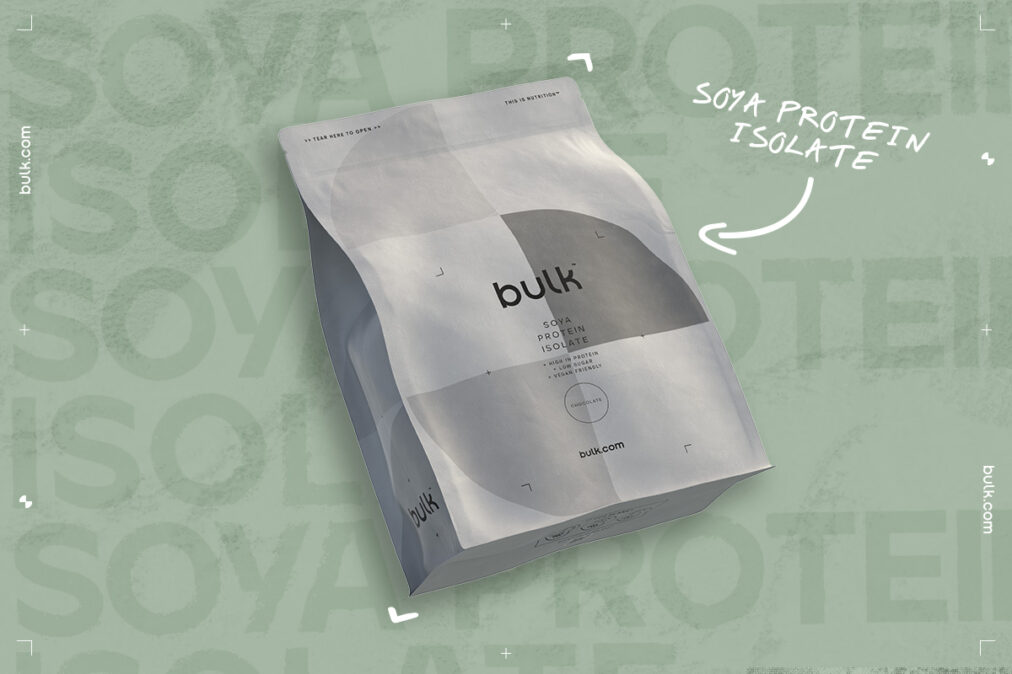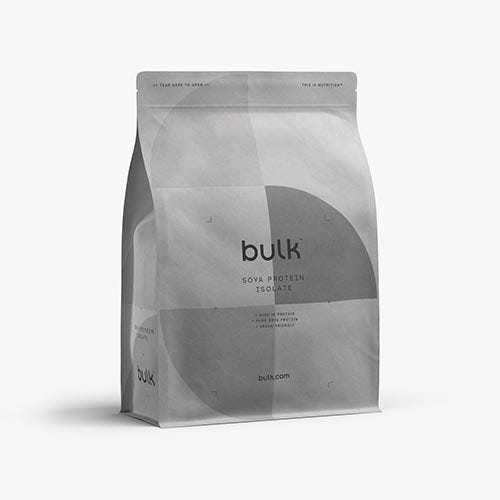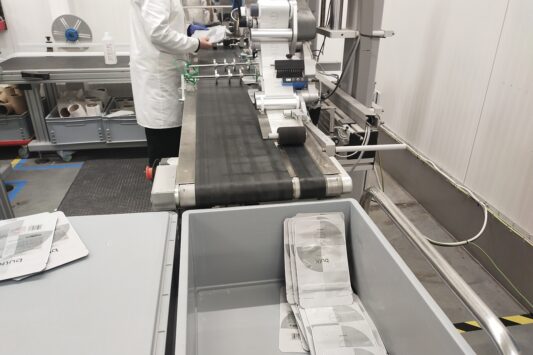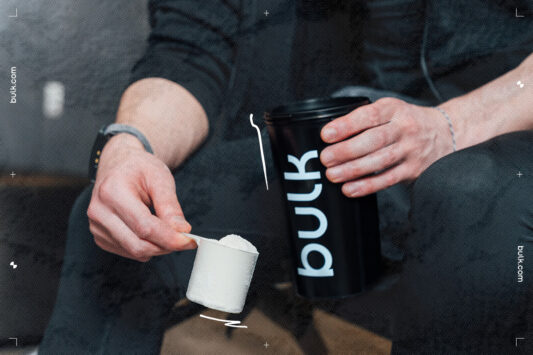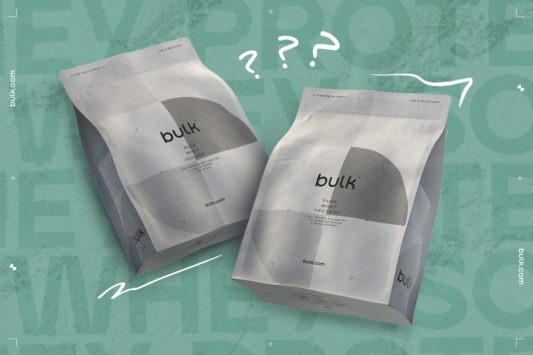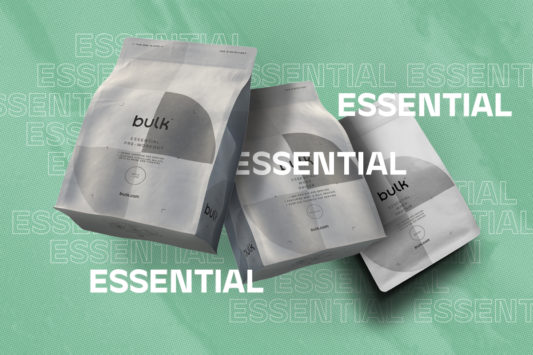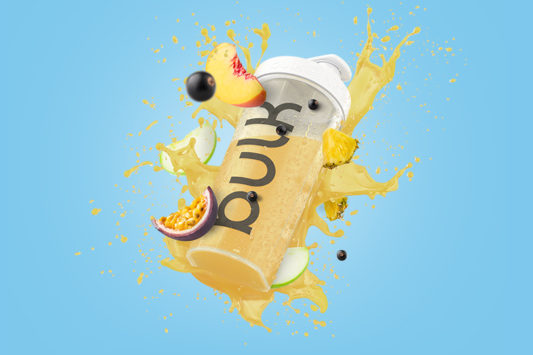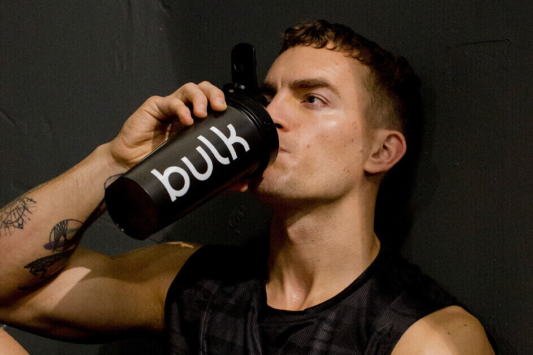Whether you’re a vegan looking for an alternative to whey protein, or like the taste of soya and want to add more protein to your diet, soya protein powder is one of the most researched, controversial protein sources out there. We want to set the record straight, and what better time to dive deeper into the world of soya protein than for World Vegan Day.
What is soya protein?
Well, you guessed it. Soya protein is (drumroll please) protein that’s found in soya products. Okay, we know that sounds pretty obvious, but it really is that simple. Foods such as tofu, tempeh and soya milk all contain soya and are an excellent source of protein for people following a plant-based diet, or those who avoid dairy.
How much protein is in soya?
The amount of protein in soya depends on what type of soya format you are consuming, such as tofu or soya milk. For the purpose of this article, we’re going to talk about soya protein isolate, as this is the format we know and love at Bulk™.
Our Soya Protein Isolate provides at least 24g protein per 30g serving, which is equal to at least 80% protein. For a vegan-friendly protein option, this is really impressive and a great alternative to dairy proteins.

What is soya protein isolate?
To keep it short and sweet, soya protein isolate (also known as soya protein isolate) is when the protein has been separated, or isolated, from soybeans. It’s made from defatted soybean flakes, so most of the fat, sugars and fibre have been removed to leave behind pure protein. This results in a super high-protein powder and works exactly the same way as a product like whey protein, while also being completely vegan.
What are the benefits of soya protein?
Growth and maintenance of muscle mass
First things first. Muscle mass. With at least 80g protein per 100g, soya protein is a high-protein product. This means, paired with regular resistance training, consuming soya protein contributes towards the growth and maintenance of muscle mass. For advice on how much protein your body can absorb and protein timing, see our blog.
No cholesterol and minimal saturated fat
A significant benefit of soya protein is that it actually contains no cholesterol and minimal amounts of saturated fat. It is also a great choice for anyone watching their calorie intake, due to the high protein, low fat and low sugar content of the product.
High levels of zinc
Something else interesting about soya protein is that it contains relatively high levels of naturally occurring zinc, which is pretty unusual for vegan protein powders. Zinc helps with the maintenance of testosterone levels, healthy skin and normal functioning of the immune system.
Dairy free
Despite its rich and creamy texture, soya protein is entirely dairy free. Soya benefits from having quite a neutral taste compared to other vegan proteins, so a lot of people don’t mind making the switch to vegan in this instance.
Inexpensive
It’s a great choice of protein powder for anyone on a budget, due to it being one of the cheapest protein sources on offer for the high amount of protein it contains.
Easy and quick to digest
At 1.0, our Soya Protein Isolate has a very high PDCAAS score. What does this actually mean, though? Well, PDCAAS stands for Protein Digestibility Corrected Amino Acid Score (it’s a mouthful, we know), and is a method of evaluating the quality of a protein based on the amino acid requirements of humans. Essentially, our ability to digest them.
Having a score of 1.0 means that after the protein has been digested, it provides 100% or more of all the amino acids required in the human diet. Pretty good, right?
Key benefits
- 24g protein per serving
- 100% vegan
- Low in fat and sugar
- Contains all nine essential amino acids
- May lower LDL (bad) cholesterol and raise HDL (good) cholesterol
- Inexpensive
- Naturally occurring vitamins and minerals
- 1.0 PDCAAS score (easy to digest)
Is soya protein good for building muscle?
Soya protein isolate is absolutely a great supplement choice for muscle building. With at least 24g protein per serving, it contributes towards the growth and maintenance of muscle mass, as well as being low in fat and sugar. It’s ideal for maintaining complete control of your macro intake.
How is soya protein powder made?
Soybean flakes are extracted from original soybeans and the fats, sugars and fibres are removed, isolating as much protein as possible. This is then blasted at high temperatures to kill any remaining bacteria and then dried into a powder – Soya Protein Powder.
For our flavoured varieties, the raw material is mixed with various flavouring substances and taste tested by our in-house product development team. Once we’re happy everything is as it should be, the powder is scaled up and blended in our manufacturing facility to give you the best-tasting and freshest product possible.
Is pea or soya protein better?
Quite simply, this comes down to personal preference. Soya protein contains ever so slightly more protein than pea protein powder, however, it is also more expensive.
Also, soya protein has more of a neutral taste than pea protein. This allows it to be mixed with things like smoothies and overnight oats without disrupting the flavour too much.
There isn’t a definitive ‘one is better than the other’ and when it comes down to it, it’s all about taste preference. And you don’t really have to choose between them. Many of our vegan customers use both pea and soya protein.
Is soya or whey protein better?
Whey protein has a more neutral taste than soya, and we have a huge flavour range in whey protein due to this neutral taste. However, whey is also a lot more expensive than soya protein.
Whey protein is also dairy based which quite a few people can have trouble digesting, so if you fall under this category or are following a vegan or plant-based diet, soya is definitely the route for you.
Interestingly, soya protein has more protein per serving than our Pure Whey Protein™ despite being less expensive. That said, whey protein is the most popular choice of protein powder for a reason.
What soya protein does Bulk™ offer?
At Bulk™, we’ve picked the most premium quality and neutral-tasting raw material to give you the best consumer experience. We have it in Unflavoured, Vanilla and Chocolate flavours (but keep your eyes peeled for more in the future).
Related articles
Want to see more vegan related content? We believe that every person, with support, has the right to transform their lives through fitness. That’s why we’ve put together hundreds of articles with expert advice, all to help you on your fitness journey. From recipes to supplement guides, see our other vegan articles.
Vegan myths Protein French toast recipe
The rise of veganism Low-calorie vegan foods
Guide for Vegan Supplements Vegan muscle building
Pasta yeast flakes recipe Fridge cake recipe
Different types of vegan protein powder Vegan oat protein bar recipe
